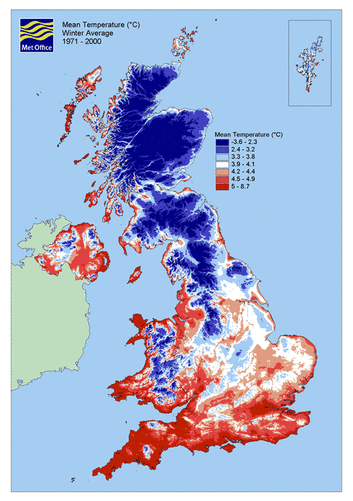London, UK – 15 October 2025
The UK government has been issued its starkest warning yet on the urgent need for climate adaptation, with top independent advisers insisting the country must prepare for a minimum of 2^\circ\text{C} of global warming by 2050. A new letter from the Climate Change Committee (CCC) stresses that current national efforts to prepare for extreme weather are critically insufficient, demanding immediate and ambitious action to protect Britain’s infrastructure and millions of homes from devastating climate impacts, including a sharp rise in flood risk.
The CCC’s advisory, a significant step-up from previous guidance, sets a new “horizon” for national planning, urging ministers to build resilience for the “weather extremes” that a 2^\circ\text{C} temperature rise above pre-industrial levels would bring by mid-century—a scenario hotter and sooner than the 1.5^\circ\text{C} goal of the Paris Agreement. This warning comes as the UK Parliament’s Environmental Audit Committee also released a report highlighting that England’s flood resilience approach is “fragmented, reactive and underfunded.”
The Stark Reality of a 2°C World by 2050
The independent climate advisers painted a grim picture of the conditions the UK must be ready to face, which go far beyond current experience. Flooding is projected to intensify significantly, posing an existential threat to communities and infrastructure.

Key Climate Impact Projections:
Flooding Increase:
Peak river flows are projected to increase by up to 40% in some catchments, drastically raising the risk of river and coastal flooding. The number of properties in England at risk of flooding is already around 6.3 million, and this is expected to rise sharply, with coastal flooding predominantly impacting England.
Heatwaves and Droughts:
The probability of a severe heatwave in any given year will double from 40\% to 80\%. The total time spent under drought conditions is also expected to double.
Infrastructure at Risk:
The combination of rising sea levels (15-25 cm by 2050) and increasing flood frequency will put unprecedented strain on essential services, including transport networks, electricity systems, schools, and health facilities.
The CCC emphasized that the UK is “not yet adapted” to the worsening extremes already being experienced, “let alone” what is anticipated, with one analysis projecting that the number of people in the UK significantly at risk of flooding could rise by 61\% by 2050 under the 2^\circ\text{C} scenario.
Urgent Calls for Building and Planning Reform
At the heart of the warnings is a failure in the planning and construction sectors to incorporate resilience against future climate threats. The CCC, supported by the Parliamentary Environmental Audit Committee, issued clear recommendations demanding a national overhaul of preparedness strategies.
Headline Points on Adaptation:
1-Tighter Planning Rules:
The government must strengthen planning rules to prevent unprotected development in current and future high-risk flood zones. Over the last decade, an estimated 110,000 new homes were built in high-risk areas, a dangerous trend that must be reversed.
2- Mandatory Building Resilience:
Building regulations must be amended to require the integration of low-cost, proven property flood resilience (PFR) measures into both new constructions and retrofitting of existing properties. PFR measures include raising electrical sockets and installing self-closing airbricks to minimise damage.
3- Catchment-Scale Solutions:
Investment must be shifted from reactive, property-focused schemes to long-term, locally led solutions at the level of entire river catchments. This includes greater use of nature-based solutions, such as wetland restoration, tree planting, and sustainable drainage systems (SuDS).
4- National Coordination:
The Environmental Audit Committee called for clearer government ownership of flood resilience, with a single overarching body providing national leadership and coordination across all agencies to move away from a fragmented approach.
Dr. Douglas Parr, Chief Scientist at Greenpeace UK, commented on the advisory, stating that “Alarm bells should be ringing in government” and warned that a 2^\circ\text{C} rise will “make life in the UK look very different, very quickly.” The advisers urged the government to use the 2050 deadline as a catalyst for major national projects, including reservoir construction, to address compounding risks like water shortages alongside flooding. The consensus among experts is that the time for reactive measures is over; the UK must now implement a proactive, long-term strategy to avoid devastating and costly consequences.
————-
Headline Points
2^\circ\text{C} Deadline:
The independent Climate Change Committee (CCC) has for the first time explicitly warned the UK government to prepare for at least 2^\circ\text{C} of global warming by 2050, stating that current adaptation efforts are “woefully underprepared.”
Flood Risk Spikes:
The report warns of “devastating” flood risk, projecting peak river flows could increase by 40\% in some areas and coastal flood risks will rise due to sea level increase.
Property Exposure:
The number of people in the UK significantly at risk of flooding is projected to increase by 61\% by 2050 under the 2^\circ\text{C} scenario.
Building Reform Urged:
The CCC and a Parliamentary report demand a national overhaul of building standards, calling for tighter planning rules to prevent new development in high-risk flood zones and making flood resilience measures mandatory for new homes.
New Climate Extremes:
The UK must prepare for unprecedented weather, including the doubling of heatwave probability to 80\% in any given year and a doubling of time spent in drought.
Call for Coordinated Action:
Experts are demanding a strategic, catchment-scale approach to flood management, utilising nature-based solutions and establishing a single, coordinated national body for flood resilience.
